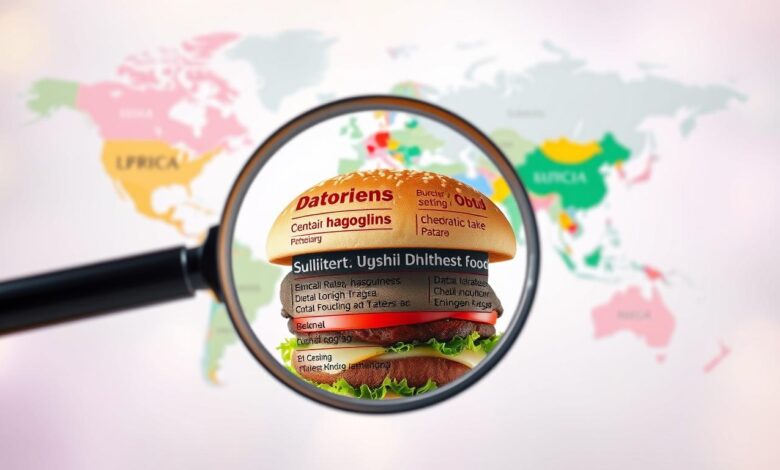Discover the Translation of the Diet

Understanding diet translation is key to making smart food choices. It’s about turning nutrition knowledge into actions we can take. A good nutrition guide is vital for this, as it shows us how to navigate the complex world of food.
By learning about diet translation, we can unlock the secrets of good nutrition. This knowledge helps us take charge of our health and wellbeing.
In today’s world, knowing about diet translation is more important than ever. It helps us make choices that are good for our health. A clear nutrition guide makes it easier to understand and follow.
This approach to nutrition is practical and easy for everyone to use. It’s the key to a healthier, more balanced life.
Introduction to Diet Translation
Key Takeaways
- Understanding diet translation is essential for making informed decisions about dietary choices
- A comprehensive nutrition guide is necessary for navigating the complex world of nutrition
- Diet translation provides a practical approach to nutrition, making it accessible to everyone
- Grasping the concept of diet translation can help individuals take control of their health and wellbeing
- A well-structured diet translation can lead to a healthier and more balanced lifestyle
Understanding the Translation of the Diet
The idea of diet translation is key to making smart food choices. It helps us understand how diet affects our health. Knowing about diet translation lets us eat better and make choices that are good for us.
When we talk about diet, we’re talking about meal planning, portion control, and nutrient balance. A good diet plan can help us reach our health goals. This could be losing weight, having more energy, or just feeling better overall. Diet translation is important because it lets us tailor our nutrition to our own needs.
- Improved nutrient intake
- Enhanced energy levels
- Better weight management
- Reduced risk of chronic diseases
By understanding diet translation and following a good diet plan, we can enjoy these benefits. The goal is to make lasting changes, not just follow the latest trends.
The Science Behind Dietary Principles
Understanding the science behind dietary principles is key to making smart food choices. Nutrition science helps us see how food impacts our bodies. By using diet translation science, we can better connect with food and boost our health.
Knowing the dietary principles is crucial for a good diet. We need to study the latest in nutrition science. Important aspects include:
- Macronutrient balance: Finding the right mix of carbs, proteins, and fats
- Micronutrient intake: Making sure we get enough vitamins and minerals
- Hydration: Drinking enough water to keep our bodies working right
Applying diet translation science lets us turn research into useful diet tips. We consider our needs, lifestyle, and health goals for a diet that fits us.
The science of dietary principles is complex. But, by grasping nutrition and diet translation science, we can make better food choices. This knowledge helps us control our health and enjoy a better life.
From Theory to Practice: Making Your Diet Work
Understanding your current eating habits is key to diet implementation. Start by assessing your diet. This means tracking what you eat, spotting patterns, and figuring out your nutritional needs. This way, you can set realistic goals that fit your lifestyle and tastes.
For successful diet implementation, create a plan you can follow long-term. Aim for sustainable changes that you can keep up with. Slow, steady changes help build lasting healthy habits.
- Keep a food diary to track your eating habits
- Identify areas for improvement, such as reducing sugar intake or increasing fruit and vegetable consumption
- Set specific, measurable goals, such as eating five servings of fruits and vegetables per day
By following these steps and makingsustainable changes, you can set yourself up for success and achieve your dietary goals.
Common Challenges in Diet Implementation
When trying to follow a diet, people often face many challenges. Diet challenges can include a lack of motivation or having too high expectations. It’s important to know these challenges to succeed in dieting.
Some big implementation obstacles are not having enough time, not finding healthy food, or not getting support from loved ones. Also, nutrition hurdles like food allergies can be tough. To beat these, making a plan that fits your life is key.
Here are some common diet challenges:
- Lack of motivation and accountability
- Unrealistic expectations and goals
- Limited access to healthy food options
- Insufficient support from family and friends
- Food allergies or intolerances
Knowing these challenges and finding ways to get past them can help you succeed. Remember, overcoming diet challenges takes time, effort, and patience.
With the right mindset and support, you can beat common diet challenges. Looking for advice from a health expert or joining a support group can help. There are many resources out there to help you overcome diet challenges.
Practical Strategies for Dietary Success
Building a healthy relationship with food is key to dietary success. Effective meal planning ensures a balanced diet. It lets people choose foods that fit their goals and tastes.
Shopping with a list helps stay on track. Planning meals and making a list avoids impulse buys. Healthy cooking methods, like grilling, keep nutrients in food. Deep-frying, on the other hand, can lose important nutrients.
- Creating a meal plan that incorporates a variety of foods
- Following shopping guidelines to avoid unhealthy purchases
- Using healthy preparation methods to retain nutrients
By using these strategies, people can develop good eating habits. Effective meal planning, smart shopping, and healthy cooking lead to a better diet.
Adapting Your Diet to Your Lifestyle
For lasting changes, diet adaptation is crucial. It means being flexible with food choices and adjusting them as needed. By adding lifestyle changes to your daily life, you can build a healthier food relationship. This boosts your chances of success.
Nutrition flexibility is a big part of successful diet adaptation. It’s about trying new foods, flavors, and cooking ways. It also means being ready to change your diet as your life does. For instance, if you’re always on the go, quick meals are key. But if you have more time, you can explore new recipes.

- Keep a food diary to track your eating habits and identify areas for improvement
- Experiment with new recipes and ingredients to keep your diet interesting and varied
- Focus on whole, unprocessed foods as much as possible
By following these tips and making lasting lifestyle changes, you can improve your food relationship. Remember, diet adaptation is a journey. It’s okay to make mistakes and adjust along the way. With time and effort, you’ll find a diet that fits your life perfectly.
Measuring Progress and Making Adjustments
To succeed in dieting, tracking your progress is key. Progress tracking means watching your food, exercise, and weight. This lets you see what works and what doesn’t. Use tools like a food diary or apps to keep up with your journey.
Making diet adjustments needs patience and flexibility. As you track, you might find some foods or habits hold you back. Adjusting your diet, like eating more protein or less sugar, can help you reach your goals.
Here are some important tips for tracking progress and adjusting your diet:
- Set realistic goals and track your progress regularly
- Use progress indicators such as a food diary or mobile app to monitor your progress
- Be patient and flexible when making diet adjustments
- Stay hydrated and listen to your body’s nutritional needs
Follow these tips and stay dedicated to your diet. This way, you can succeed and keep a healthy relationship with food. Always put your health first. If you need help, talk to a healthcare professional or registered dietitian.
Building Long-term Dietary Habits
Creating lasting dietary habits needs knowledge, planning, and commitment. Success in dieting comes from setting achievable goals and regularly checking your progress. Adjust your plans as you go along.
Creating Sustainable Routines
To build sustainable routines, try these tips:
- Begin with small changes to your daily life
- Emphasize adding good habits, not cutting out foods
- Discover healthy swaps for your favorite dishes
Overcoming Setbacks
Overcoming setbacks is key to lasting dietary habits. Don’t be too tough on yourself when you slip up. Use these moments to learn and keep moving forward. Remember, building healthy dietary habits is a journey, not a sprint.
Stick to these strategies and stay true to your goals. Always choose sustainable routines and be gentle with yourself when facing setbacks.

Conclusion: Making Your Diet Work for Life
Long-term diet success isn’t just about strict rules. It’s about building a healthy relationship with food that fits your life. By using the strategies we’ve discussed, you can make your diet work for life and enjoy lasting nutrition for life.
Diet success is a journey, not a goal. It’s about finding balance and being flexible. Make changes as needed to keep your diet supporting your health. Stay committed, be patient, and celebrate your small wins.
The secret to long-term diet success is making healthy habits part of your daily life. A positive mindset, self-care, and a supportive network can change how you view food. This leads to lasting results.
FAQ
What is Diet Translation?
Diet translation makes nutrition easy to follow in everyday life. It turns science into steps you can take. This helps you create a diet that fits your needs and lifestyle.
Why is Diet Translation Important?
It connects nutrition knowledge with real life. By making diet info simple, you can make better food choices. This leads to better health and happiness.
What are the Key Components of Dietary Implementation?
Key parts include planning meals, shopping for food, and cooking. Also, controlling portions and tracking progress are important. These steps help you stick to a healthy diet long-term.
How Can I Assess My Current Diet?
Start by keeping a food journal. Note what you eat, how much, and any dietary needs. This helps you see what changes you need to make.
What are Some Common Challenges in Diet Implementation?
Challenges include fighting cravings and emotional eating. Also, dealing with social situations and routine changes can be tough. Knowing these challenges helps you find ways to overcome them.
What are Practical Strategies for Dietary Success?
Strategies include planning meals and making shopping lists. Batch cooking and portion control are also helpful. These make it easier to eat healthy every day.
How Can I Adapt My Diet to My Lifestyle?
Find a balance between your diet and daily life. Adjust meal times and find healthy, easy options. Being flexible for social events or travel is key.
How Can I Measure Progress and Make Adjustments?
Track weight, energy, and how you feel. Use this info to tweak your diet. This keeps your diet on track with your health goals.
How Can I Build Long-term Dietary Habits?
Create lasting routines and find ways to bounce back from setbacks. Enjoy physical activities and eat mindfully. S





